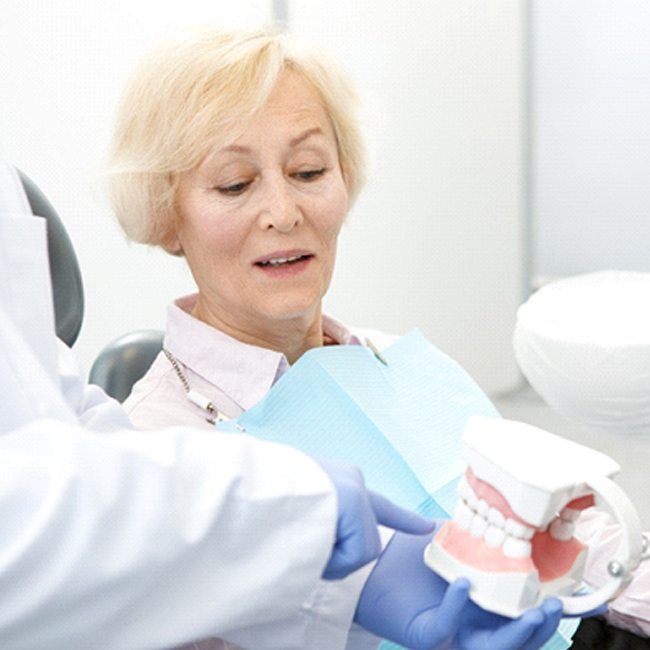

Losing a majority of your teeth can cause your health, appearance, and quality of life to decline. Dentures are the most common solutions to extensive tooth loss, but as replacements they’re incomplete; they won’t make up for the missing tooth roots that were previously responsible for stopping bone resorption. Here at OraBell Dental Implant Centers, our dentists can combine custom-made dentures with implants to recreate entire smiles – roots and all through dental implant dentures in Los Angeles, CA.

An implant denture is made out of the same materials as a traditional denture, but instead of sitting on the gums and relying on gravity or suction to hold it in place, it is anchored to four or more dental implant posts. Depending on your preferences or needs, you can get two different kind of implant dentures.
Once a fixed denture has been attached to implants, it will stay in the mouth 24/. This is a very convenient option for those who don’t want to have to remove their new teeth every night or for those who want to continue brushing and flossing as they did before.
Some implant dentures are design to snap on and off, letting you take them out of your mouth any time. They’ll still be firmly held in place when in your mouth, but you can take them out for easy cleaning.

Implant dentures are not placed in one visit. The typical process is usually as follows:

Implant dentures might be right for you if you’ve lost all or most of your teeth, but first we need to make sure that surgery is a viable option. We need to confirm that you have healthy gums and a jaw capable of supporting the implants. In cases where bone loss has already occurred, you might need bone grafting to restore lost bone density.


Implant dentures in Van Nuys are a nearly perfect replica of your real teeth, but they are a large investment. We understand you probably have several concerns before you are ready to commit to them. Your dentist will explain everything during your implant denture consultation. Here are the answers to a few frequently asked questions to calm your nerves.
Not everyone interested in implant dentures will require bone grafting, but it isn't uncommon. You can lose up to 25% of your jaw’s density within the first year of losing a tooth, which continues over time. Not to mention, advanced gum disease and other issues can weaken your bone. Since implant posts are surgically placed into the jaw to mimic roots, you must have adequate bone density to support the posts. Your dentist will review a CT scan of your mouth during the consultation process. If they find any areas of bone loss, they may recommend bone grafting. The minor procedure uses bone from another area of your body or from a donor to restore your jaw. Although it may add an additional step to your treatment, it will give your new smile the foundation it needs to thrive.
Every situation differs, so there isn't any way to know how many you will need until after examining your mouth. Some patients may only require 4 to 6 posts, while others may need 10 or more. Each post will need an abutment to connect your denture. We will explain the amount necessary during your consultation.
You don't have to worry about a painful procedure because your jawbone doesn't have any nerve endings. You'll also be sedated, so you won't be aware of any pain. Although you won't feel anything during your placement surgery, your mouth will be sore for a few days. You can manage your discomfort using a prescribed or OTC pain reliever. Applying a cold compress to the outside of your mouth can numb the area temporarily while reducing swelling and bruising. Your dentist will also review any additional aftercare instructions, like following a liquid diet.
After your jaw has integrated with the post through osseointegration, your new set of teeth will feel natural in no time. Initially, your denture may feel a little foreign in your mouth, but soon you may forget they aren't your real teeth. You will smile and speak confidently knowing your denture will never fall out. You will never have to worry about slipping or irritation. You can even enjoy your favorite foods again because you'll regain 70% of your natural biting force; however, it's best to limit those that are hard, sticky, or chewy. If you can't resist a juicy steak, cut it into small pieces to make it easier to chew.
The timeline for implant dentures varies from patient to patient. However, you can expect to wait at least a few months to get your beautiful new teeth. If you require extensive preparatory treatment, such as a major bone graft, multiple extractions, or help to recover from gum disease, it may further extend your start-to-finish treatment time. Rest assured that however long it takes for your restored smile to be finished, the end result will be worth it!
You should be diligent about oral hygiene. That means you should brush your teeth at least twice a day with a soft-bristled brush and a toothpaste that has the American Dental Association Seal of Approval. You may also need to use a floss threader or water flosser to clean the area where your denture meets your gums.
If your implant denture is removable, you should take it out of your mouth every night to thoroughly clean it. Regularly soaking it in a cleansing solution is also recommended.
No matter what type of implant denture you have, you should strive to visit your dentist regularly for checkups so they can monitor your oral health and the state of your prosthetic.
At first, your prosthetic may feel a bit strange in your mouth. Until you get used to using it, try to eat mostly soft foods. If your gums are a little tender, sipping on cool water can help. You can also take over-the-counter pain relievers if necessary. In general, adapting to implant dentures is much easier than getting used to traditional forms of tooth replacement. In what seems like no time at all, your implant denture may feel like a natural extension of your body!
If you encounter any problems while you are getting used to your new prosthetic, give us a call. We will do all we can to assist you.
Implant dentures are suitable for virtually all adults who have suffered significant tooth loss. Whether you are in your twenties or nineties, they may be able to help you. However, most patients who get them tend to be up in years because tooth loss becomes increasingly common with age. In fact, according to one estimate from the CDC, approximately one-quarter of adults over age 65 have eight or fewer teeth, while about 1 in 6 in that age group has lost all of their teeth.
An OraBell doctor will diagnosis and will determine if you are a candidate for any of our treatments.
